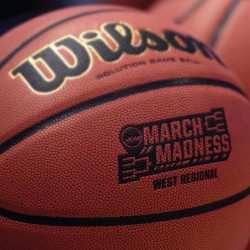$9.7Bn in Illegal Wagers To Be Placed On 2018 NCAA Basketball

The 2018 NCAA Men’s Basketball Tournament, also known as March Madness, takes place between March 13 and Apr 2, with 68 college basketball teams taking part in the hugely anticipated single-elimination style sporting event. During the extravaganza an estimated $10 billion is expected to be wagered by gamblers, of which a staggering 97 percent will be through illegal channels, according to the American Gaming Association (AGA).
$10 Billion in Wagers
March Madness is traditionally one of the biggest events of the US sporting calendar, with its games broadcast by several channels inside the US, as well as across the whole world. Needless to say, basketball fans have demonstrated a huge appetite for betting on their favorite teams, players and outcomes of the various matches, and last year around 70 million people bet a collective $10.4 billion on the NCAA tournament, or 13 percent more than in 2016.
However, only 3 percent of that amount was wagered through legal businesses, with the AGA estimating the same ratio will be maintained this year. According to the gaming industry association, the remaining $9.7 billion in bets will be placed via illegal bookies, offshore betting sites, as well as other unlicensed channels.
Lost Revenues
The Professional and Amateur Sports Protection (PASPA) Act of 1992 placed a ban on sports betting throughout the country, except in Nevada, with sports lotteries also allowed in Montana, Oregon, and Delaware. The law has proved largely ineffective, though, and an illegal sports betting industry has subsequently flourished in the US, with $154 billion having been spent on sports betting in 2016, of which the majority was placed using unlicensed sites and bookmakers.
By contrast, legal gambling generated just $27.7 billion for local and state governments in 2015, according to research conducted by the State University of New York System’s Rockefeller Institute of Government. However, a regulated sports betting industry could produce revenues of around $41.2 billion per annum, with $3.4 billion in taxes then being funneled towards government coffers, according to a study commissioned by the AGA and carried out by Oxford Economics.
Appetite for Change
Furthermore, the results of a survey released by The Washington Post and the University of Massachusetts Lowell last year showed that there exists a huge appetite for a change in the current law, with 55 percent of Americans wanting to see a fully legalized sports-betting industry in the country.
Commenting upon the situation, Geoff Freeman, CEO of AGA, said that the federal government’s refusal to legalize sports betting is causing a massive outflow of money from local economies, and as he explains:
“Our current sports betting laws are so out of touch with reality that we’re turning tens of millions of Americans into criminals for the simple act of enjoying college basketball. The failed federal ban has created an illegal, unregulated sports betting market that offers zero consumer protections and generates zero revenue.”
Up to Supreme Court to Decide
In 2012, New Jersey Gov. Chris Christie was sued by the NCAA, NFL, NBA, NHL and Major League Baseball over his attempt to legalize sports betting in the Garden State’s casinos and racetracks. According to these organizations, Christie’s move was a “clear violation” of PASPA, with the U.S. Department of Justice then lending its support to the federal sports ban in 2013.
Although a ruling was later made in favor of the leagues, room was left open for New Jersey to seek a repeal of its sports wagering ban. Despite a subsequent appeals court ruling against Christie by 2-1 in 2015, the New Jersey Governor filed an appeal with the Supreme Court in 2016, which on June 27, 2017 then said that it was prepared to hear the case. On Dec. 4, 2017, The Supreme Court then heard oral arguments concerning the case, with a decision expected on the issue sometime this summer, and a positive outcome for New Jersey having seismic implications for the rest of the country.
In fact, 18 US states have already introduced laws allowing them to take quick advantage of the situation in the event of New Jersey winning its case, all hungry for the extra tax revenues that a regulated industry may bring. At this point, their chances of success are looking good, too, with legal experts predicting that the Supreme Court is likely to overturn PASPA within the next few months. Not all the bills are the same, though, with variations including the amount of excise tax to charge, and at which venues sports betting will be allowed to take place.










